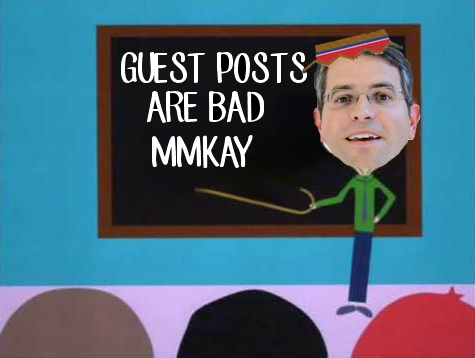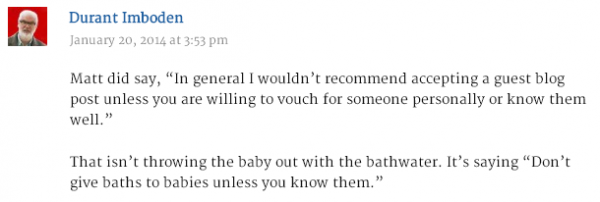This week began in chaos with conflicting views regarding Matt Cutts’ lengthy post on his personal blog, declaring that the SEO world needs to “stick a fork in it: guest blogging is done”, much to the displeasure (yet understanding) of SEOs everywhere. His growing resentment toward the exploitation of guest blogging has been widely documented over the past year, with his Webmaster Q&A videos showing him becoming more and more frustrated at the inflation of guest blogging questions like “How can I guest blog without it looking like I pay for links?”.
Matt does seem genuinely saddened by what guest blogging has become. And much like when a father tells his child that he’s disappointed in them, we all feel it and hang our heads down in shame even when we’re not the culprits ourselves. That’s because we can empathise with Matt. Guest blogging communities used to thrive with passion for writing and sharing their perspectives with a whole range of audiences that they would otherwise not have had access to. Unfortunately in recent years, guest blogging has become cheapened by those spinning articles and farming content from the third world for backlinks. And although guest blogging communities are still continuing to thrive, they are continuing to do so for all the wrong reasons. The blogosphere is overrun with lazy marketing agencies looking to abuse a vulnerable system. And the ones who take the time to produce a high-quality piece of writing unfortunately just get eclipsed due to the fact that a lazy marketer can throw out ten low quality articles for every high quality article, giving the practice a bad reputation.
However, illegitimate guest posting can be pretty difficult to detect depending on the quality of the content and, to date, there is no algorithmic process to distinguish between a legitimate guest post and one sought out merely to gain a couple of backlinks. So aside from serving as a eulogy to a once highly regarded activity, Matt Cutts’ blog post doesn’t affect much really. It’s nothing new. Low quality blogs churning out obviously spammy guest articles will be penalised upon manual review, should they get caught. As they have been before. Google regards guest blogging for SEO as a link scheme, maintaining that “any links intended to manipulate PageRank or a site’s ranking in Google search results may be considered part of a link scheme and a violation of Google’s Webmaster Guidelines. This includes any behavior that manipulates links to your site or outgoing links from your site”. (To be clear, nofollowed links do not affect PageRank and so are beyond the Spam Team’s jurisdiction.) You can read more on their views about link schemes here, but basically Google warns that the following activities will result in a manual penalty and cause a negative impact in your rankings:
That is, again, should you get caught. The trouble is Google are, for now, powerless against these popular link building tactics. Yes, they can filter guest articles with Panda to tackle “thin content” and Penguin to deal with the spam, but a well written article with naturally anchored links on a good authority website is still going to triumph even if it was written for the sole purpose of link acquisition. And if the article is thoughtfully constructed and unique, then who is Google to say that it is a link built and not a link earned?
Matt Cutts expresses that guest blogging shouldn’t be done with the intention of building links, but as a way to gain exposure for either yourself or the brand that you’re representing. It should be a way to gain real referral traffic, and you should be rewarded for an article well written rather than an article well placed. And though it is very difficult to disagree with that, I can’t help but feel that it’s a little unfair toward those who are blogging honestly and authentically and deserve a backlink or two for it as recognition for their work, as well as the exposure that the article gives them. Of course, like with anything, when done in excess, that is where the line should be drawn.
Matt suggests that, from now, webmasters only allow guest posts to be published from those that they personally know, stating: “I’m not trying to throw the baby out with the bath water. There are still many good reasons to do some guest blogging”. To which one witty commenter replied:
The man speaks truth. Not all of us have a huge Circle of trusted contacts and, for those that don’t, guest blogging on strangers’ websites is a valuable tool to gain the exposure they need to get their foot through the door (or name on your screen).
Will we see a decline in emails containing guest posting pitches? I sincerely doubt it.
Will we see a decline in blogs accepting guest posting pitches? Maybe. But then again… I doubt it.
New blog post: The decay and fall of guest blogging http://t.co/P0BnRufnKQ
— Matt Cutts (@mattcutts) January 20, 2014




